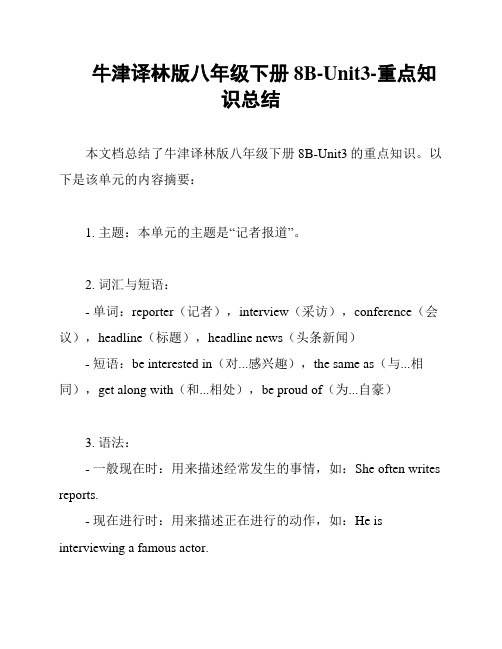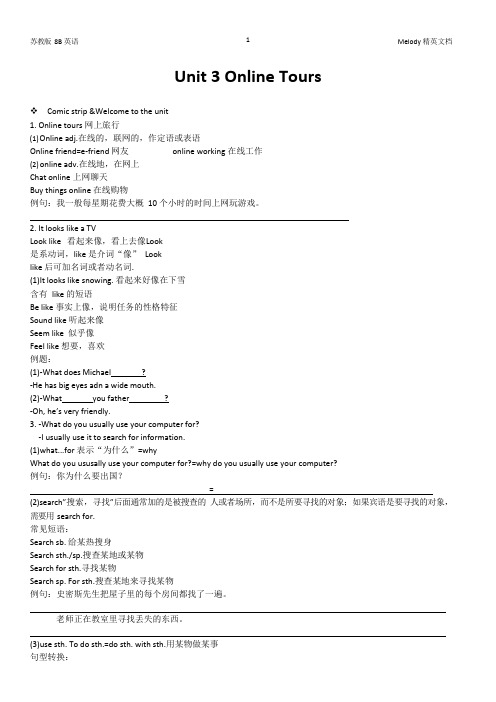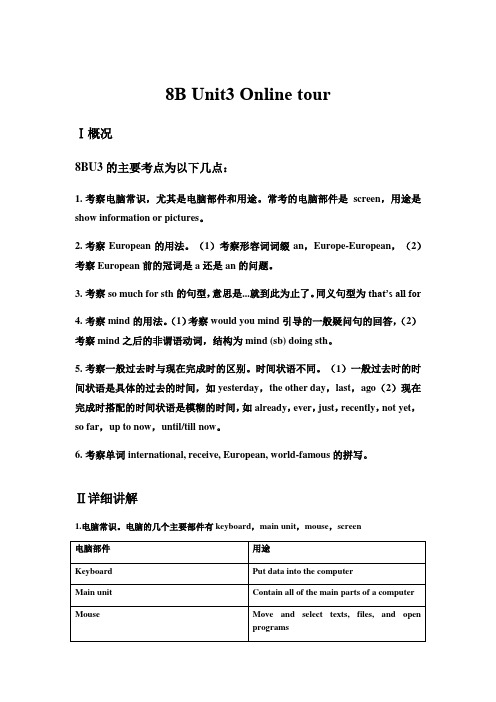8BUnit3学习知识点.docx
- 格式:docx
- 大小:59.62 KB
- 文档页数:21

牛津译林版八年级下册8B-Unit3-重点知识总结本文档总结了牛津译林版八年级下册8B-Unit3的重点知识。
以下是该单元的内容摘要:1. 主题:本单元的主题是“记者报道”。
2. 词汇与短语:- 单词:reporter(记者),interview(采访),conference(会议),headline(标题),headline news(头条新闻)- 短语:be interested in(对...感兴趣),the same as(与...相同),get along with(和...相处),be proud of(为...自豪)3. 语法:- 一般现在时:用来描述经常发生的事情,如:She often writes reports.- 现在进行时:用来描述正在进行的动作,如:He is interviewing a famous actor.- 一般过去时:用来描述过去发生的事情,如:The reporter interviewed the mayor yesterday.4. 阅读理解:本单元共有两篇阅读理解,题目分别是“Interview with a Celebrity”和“A Day in the Life of a News Reporter”。
这两篇文章讲述了记者采访名人和新闻记者的工作日常。
5. 语言点:- 名词性从句:如:I know what you said.- 形容词性从句:如:The news is interesting because it is about a famous actor.- 定语从句:如:The boy who is talking to the reporter is my friend.以上是牛津译林版八年级下册8B-Unit3的重点知识总结,希望对你有帮助。

Unit 3 Online Tours❖Comic strip &Welcome to the unit1.Online tours 网上旅行(1)Online adj.在线的,联网的,作定语或表语Online friend=e-friend 网友online working 在线工作(2)online adv.在线地,在网上Chat online 上网聊天Buy things online 在线购物例句:我一般每星期花费大概10 个小时的时间上网玩游戏。
2.It looks like a TVLook like 看起来像,看上去像Look是系动词,like 是介词“像”Looklike 后可加名词或者动名词.(1)It looks like snowing. 看起来好像在下雪含有like 的短语Be like 事实上像,说明任务的性格特征Sound like 听起来像Seem like 似乎像Feel like 想要,喜欢例题:(1)-What does Michael ?-He has big eyes adn a wide mouth.(2)-What you father ?-Oh, he’s very friendly.3.-What do you usually use your computer for?-I usually use it to search for information.(1)what...for 表示“为什么”=whyWhat do you ususally use your computer for?=why do you usually use your computer?例句:你为什么要出国?=(2)searc h”搜索,寻找”后面通常加的是被搜查的人或者场所,而不是所要寻找的对象;如果宾语是要寻找的对象,需要用search for.常见短语:Search sb. 给某热搜身Search sth./sp.搜查某地或某物Search for sth.寻找某物Search sp. For sth.搜查某地来寻找某物例句:史密斯先生把屋子里的每个房间都找了一遍。

8B Unit3 Online tourⅠ概况8BU3的主要考点为以下几点:1.考察电脑常识,尤其是电脑部件和用途。
常考的电脑部件是screen,用途是show information or pictures。
2.考察European的用法。
(1)考察形容词词缀an,Europe-European,(2)考察European前的冠词是a还是an的问题。
3.考察so much for sth的句型,意思是...就到此为止了。
同义句型为that’s all for4.考察mind的用法。
(1)考察would you mind引导的一般疑问句的回答,(2)考察mind之后的非谓语动词,结构为mind (sb) doing sth。
5.考察一般过去时与现在完成时的区别。
时间状语不同。
(1)一般过去时的时间状语是具体的过去的时间,如yesterday,the other day,last,ago(2)现在完成时搭配的时间状语是模糊的时间,如already,ever,just,recently,not yet,so far,up to now,until/till now。
6.考察单词international, receive, European, world-famous的拼写。
Ⅱ详细讲解1.电脑常识。
电脑的几个主要部件有keyboard,main unit,mouse,screen1.A________is used to show us pictures or information at the front of a TV or computer.A.keyboardB.screenC.mouseD.main unit答案B分析考察名词辨析。
句子大意为:电视或电脑的前端屏幕被用来展示画面或信息。
keyboard 是键盘,screen是屏幕,mouse是鼠标,main unit是主机,都是电脑相关的部件。

牛津译林版八年级下册8B-Unit3-知识点
归纳
1. 课文概述
本单元的主题是“多元文化”,通过阅读介绍了澳大利亚的土著文化以及其他多元文化的故事,增加了我们的文化视野。
2. 单词和短语
本单元中涉及的一些重要单词和短语有:
- native: 本地的
- tribe: 部落
- ancestor: 祖先
- artwork: 艺术作品
- traditional: 传统的
- identity: 身份
3. 语法知识点
本单元涵盖了以下语法知识点:
- The Third Conditional (第三条件句): 用于表示在过去某个时间发生的假设情况,其结果与现在相反。
例如:If I had studied harder, I would have passed the exam.(如果我更加努力研究,我就能通过考试。
)
4. 阅读和写作技巧
本单元的阅读和写作技巧主要包括:
- 掌握阅读理解技巧,如扫读和细读;
- 研究如何使用上下文推断单词的含义;
- 训练自己写作技巧,如写作描述性短文和议论文。
5. 文化背景
本单元通过介绍澳大利亚土著文化,让学生了解到不同的文化背景对人们的生活和价值观有何影响。
6. 研究目标
本单元的研究目标包括:
- 熟练掌握本单元的重要词汇和短语;
- 理解并正确运用第三条件句;
- 提高阅读和写作技巧;
- 增加对不同文化的了解和尊重。
以上是牛津译林版八年级下册8B-Unit3-知识点的归纳,希望对你有所帮助。

(牛津初中英语总复习) 8B Unit 3一.【精选词汇】㈠重点短语1. I have no idea.=I’ve no idea.=I don’t know.我不知道。
(p40)2. turn on the TV →turn on/off打开/关闭…,turn up/down调大/调低;都是“动词+副词”。
3. change the channel换台→on Channel…在…台,e.g. on CCTV-5→拓展:the English Channel英吉利海峡4. different uses of computers计算机的不同用途:draw and design, play computer games, search for information, send and receive e-mails收发电子邮件, do word processing进行文字处理, write computer programs编写计算机程序(p41)5. travel around the world in eight hours八小时环游地球,educational CD-ROM教育软件(p42)6. come out (书等)出版,发行,发表,不能用于被动语态,可以转化为be published。
〈知识链接〉When will her new novel come out?=When will her new novel be published?〈用法拓展〉⑴(太阳、月亮或星星)出现;露出, e.g. The rained stopped and the sun came out.⑵(花朵)开放;(草)出芽,e.g. In March flowers and grass come out.7. learn English and geography at the same time同时学英语和地理→at the same time同时〈知识链接〉learn and play at the same time边学边玩=play the lead role of…8. the main character主角→play the main character of…扮演…,the best actor最佳男主角,the best actress最佳女主角〈知识链接〉play the role…9. have/get itchy feet渴望旅行, e.g. She has gone to Australia-she has always had itchy feet.10. help you learn English by testing your knowledge of English grammar and vocabulary (p43)〈知识链接〉⑴by介词,通过某种方法、手段,后接名词或动词-ing。

8B Unit 3 知识梳理一. 重点单词A.四会单词1.online adj. 联网的,在线的 2.television n.. 电视=TV3. program n. 电脑程序4. role n 角色5. point n 分数.6. level n.等级7. knowledge n.知识8. grammar n. 语法9. reach v 到达10.screen n.屏幕11. pass v 通过12.mark v 做标记13. purple n./adj. 紫色,紫色的14.keyboard n. 键盘15. menu n. 菜单16.mouse n.鼠标17.e-dictionary n. 电子词典18.restart v 重新启动19.connect v 连接20. foot n. 英尺21.total n. 总数,总和22.free adj 自由的23. Mars n. 火星24.set v 设置背景25.daily adj 每日的,日常的26.course n. 课程27. telephone n.电话28.tour n. 旅行29. radio n. 收音机30. package n.一套东西,包裹31. cover v 涉及,包括32. order v订购33. simple adj. 简单的34.save v 保存3. control v 控制,支配B. 词形转换1.educational adj—educate v—education n. 2. designer n—design v3. travel v —traveled —traveller n4. asleep .adj—sleep v—slept—slept—sleepy adj.5.correct---correctly—incorrect–--incorrectly6.foot—feet7.produce v—producer n—product n—production n8. create v—creative adj—creation n二.重点词组1.look like看起来像2.the remote control遥控器3.turn on 打开4.turn off关上5.turn up声音调大6.turn down声音调小7.change the channel换频道8. a writing competition作文竞赛9.want to do sth想要做某事cational CD-ROM教育光盘11.learn more about computers了解关于更多电脑的知识12.the different uses of computers电脑的不同用途13.draw and design绘画和设计14.play games玩游戏15.search for the information寻找信息16.send and receive e-mails发送和接收电子邮件17.word processing文字处理18.write computer programs编写电脑程序19.(travel) around the world in eight hours八小时环游全世界e out 出版,发行21.help sb (to) do sth帮助某人做某事22.help sb with sth在某方面帮助某人23.at the same time同时24.main charater主要角色25.a thirteen-year-old boy一个13岁大的男孩26.love travelling喜欢旅行27.one day某天28.look at the beautiful sky看美丽的天空29.fall asleep睡着了30.have a very strange dream做了一个奇怪的梦31.in one’s dream在某人的梦里32.a golden cloud一片金色的云33.get a point得一分34.every time每次35.get enough points得到足够的分数e down下来37.carry off to带….到….38.play the role of扮演……的角色39.the knowledge of English grammar and vocabulary英语语法和词汇的知识40.a lot of useful information很多有用的信息41.for example例如42.many other interesting places许多其他的名胜43.pass a level通过一级44.a map of the world一张世界地图45.find out发现,弄清楚46.sell out 买完47.start/begin with以……开始48.none of them他们中没有一个49.on the screen在屏幕上50.on the computer 在电脑上51.send sb sth=send sth to sb把某物送给某人52.print out打印出53.click on点击54.let sb do sth让某人做某事55.do some exercises做练习56.mind doing sth介意做某事57.not at all根本不58.on the television在电视上59.many new kinds of computers许多新种类的电脑60.go to the cinema=see a film去电影院/看电影61.keep sb doing sth使某人一直做某事62.need sb to do sth需要某人做某事63.thanks for doing sth感谢做某事64.agree to do sth同意做某事65.agree with sb同意某人的意见66.do shopping online网上购物67.in the short play在短剧中68.Would you please do sth?你愿意做某事吗?69.take place 发生70.look worried看起来焦虑71.as soon as一…就72.go to bed 上床睡觉ugh at嘲笑74.all over the world全世界75.in the dining hall在餐厅76.fall off the bike从车上摔下来77.store the information存储信息78.a floppy disk软盘79.a hard disk硬盘80.be made of+可看出材料的(由…制造) (The desk is made of wood.)81.be made from+不可看出材料的(The paper is made of grass.)82.be made in+地点(The Tv is made in Japan.)83.What happened to sb? 某人发生了….84.knock at the door敲门85.plan to do sth计划做某事86.watch a football game观看足球比赛87.make sb do sth使某人做某事88.need doing=need to be done需要做… (My hair needs cutting.=My hair needs to be cut.)89.restart the computer从新启动电脑90.wake up唤醒91.take a trip to+地点去某地旅行92.prepare to do sth准备做…93.prepare sth准备某物94.prepare for sth为某事做准备95.be prepared to do sth准备做某事96.work out计算出97.choose to do sth选择做某事98.prefer to do sth宁愿做某事(I prefer to swim here.)99.prefer sth喜欢某物(I prefer the kind apple.)100.prefer A to B宁愿要A不要B(I prefer apples to oranges .)101.prefer doing sth to doing sth宁愿做某事不做某事(I prefer swimming to skating.)102.warn sb to do sth 警告某人做某事103.warn sb not to do sth警告某人不做某事104.on one’s way home在某人回家可路上105.look out of the window向窗外望去106.the sports meeting运动会107.put off推迟,延期108.have a good(great,nice,wonderful) time 玩得开心109.national treasure国宝三.重点句子1.I have no idea.=I don’t know.我不知道.2.It looks like a television.它看起来像一台电视.(look like )3. What do you usually use your computer for?你通常用你的电脑来做什么?What…for?=Why…?Eg. What do you buy the computer for ?你买电脑干什么?Why do you buy the computer? 你为什么买电脑?4. I usually use it to search for information.=I usually use it for searching for information.我通常用它来查找信息.be used for doing sth=be used to do stheg. The knife is used for cutting apples.=The knife is used to cut apples. 刀子是用来切苹果的。
8B Unit3知识点ed to过去常常,其后跟动词原形。
He used to be short.I used to swim in the river when I was young.辨析:used to do与be used to (doing) sth.2.describe vt.描述;形容Can you describe the man you saw?The policemen asked me to describe howit happened?description n.说明;形容3.fisherman [C]渔民fishermenMr Li is a fisherman.Two fishermen are fishing.fishery [C]渔场3.although conj.虽然;尽管,与though同义,用来引导一个让步状语从句。
英语中,如果用了although或though就不能再用but,但可以用yet或still。
although较正式,多用于句首,though在非正式语体中较为普遍,多用来表示强调或用于倒装句中。
Although he is poor, he is happy.Although it rained, the boys still played outside.4.fit adj.健壮的;健康的,指因经常锻炼而使形体健美、适中。
He runs every morning and that’s why he’s so fit.To keep fit, she eats a lot of vegetables and fruits.fit v.合适,侧重“尺寸、大小合适”This coat doesn’t fit me.5.dive vi.潜水,常与down/into连用。
The young man dived down and took some photos of fish.He dived into the river to save the boy.6.up to到达(某数量、程度等);至多有The temperature went up to 30o C yesterday.His storybook are up to 50.up to now到现在为止,相当于by nowUp to now he is still sad.7.set off出发;动身,与set out同义,是不及物动词短语They set off at night.Will you set off/out early tomorrow?8.ready adj.准备好的,get/be ready for为……做好准备Mother gets ready for dinner.Tom is ready for the exam.be ready准备好的Are you ready?be ready to do sth.准备做某事I’m ready to go.9.tie… around栓……在……周围1)tie to把……系在……上He tied the horse to a tree.2)tie up系好;捆好Please tie up your safety bet.10.stop… from doing sth.阻止……做某事We should stop people from polluting the river.No one can stop the little girl from crying.prevent… from 在主动句中from可以省略,与stop… from用法相同keep …from 其中from 不可省略The heavy rain prevented/kept us from climbing the mountain.11.reach vt.到达;抵达Don’t worry. We’ll reach Beijing in time.辨析:reach,get与arriveattract one’s attention吸引某人的注意Paper cutting attracted children’s attention.13.up and down起伏;上下波动Don’t walk up and down in front of me.The price of vegetables is up and down.14.after dark天黑后,黄昏后After dark, he made a fire.People go out for a walk after dark.15.hang vt.悬挂,吊,其过去式、过去分词hung, hung。
8B Unit3 Online tours单元知识点汇总Comic strip&Welcome to the unit1.It looks like a TV.它看起来像台电视机。
look like意为“看起来像”,like此处用作介词,意为“像,如……一样”,后接名词或代词作宾语。
look forward to期待,盼望look after照料,照顾look out当心,小心look over检查look at看look up查阅(词典)look for寻找look down on/upon轻视,瞧不起2.I agree.我同意。
agree此处用作不及物动词,意为“同意”。
I don't agree.我不同意。
①agree on意为“在……方面取得一致意见”,主语必须指协调的双方或多方。
①agree to+表示“提议、办法、计划”等的名词,意为“同意某事”。
①agree with sb.意为“同意/赞成某人的意见”。
①agree to do sth.意为“同意做某事”。
①agree +宾语从句,意为“同意……”。
3.Look,this programme began an hour ago.看,这个节目一小时前开始的。
begin(began,begun)此处用作不及物动词,意为“开始”。
School begins in September.学校9月份开学。
begin也可用作及物动词,begin doing sth.和begin to do sth.都表示“开始做某事”。
4.It's boring.它很枯燥。
boring形容词,意为“没趣的;令人厌烦的”,常用来说明事物具有的特征,故常修饰物;bored也是形容词,意为“感到无聊的”,常用来说明人的感受,故常修饰人。
用法类似的词还有excited,exciting;surprised,surprising;interested,interesting等。
8B Unit 3知识点解析与练习1. online 1)adj.联网的,在线的go on/take an online tour 2)adv.在线chat online2. It looks like a TV. (对划线部分提问)_________ _________ it ________ like(同义句)3. agree with sb.同意某人的观点agree to do sth.同意做某事I can ’t agree (with you) more.我非常同意(你的观点)。
4. programme [c]n.节目,计划,方案This programme began an hour ago. = This programme ______ _____ _____ _____ an hour.5. bore v. ---boring/bored adj.(bor e) What a good writer! He turns a __________(bore) story into a new one that I don ’t feel _________with it.6. control:1) remote control遥控器2)v. control过去式_________control oneself/ the country7.different parts of a unit1)screen [c]n.屏幕_____________________在屏幕上2) main unit主机unit [c]n.机件;单元3) keyboard [c]n.键盘key ? 键 ________ pl. ?钥匙the key to the door ?秘诀the key to success4) mouse [c]n.鼠标复数:mouses或miceThe ___________ (mouse) here match the keyboard well.8. 1) use sth. for sth./ doing e sth. to do sth.I usually use my computer to search for information. (对划线部分提问)__________ _________ you use your computer __________ __________(改为同义句)__________ _________ you use your computer ___________2) search for sth. +介词+sp.= search sp. for sth.. I searched for my notebook in my bag. = _______________________________.3) 收发邮件 __________________________send sb. sth.= send sth. to sb. send---_________(过去式)receive sth. from sb.watch video s9. travel around the world环游世界different places around the world世界的不同地方How soon用于将来时对“in+段时间”提问--- __________________ will he come back home --- In ten minutes.How long对段时间、长度提问For two hours. / Two metres long.How far对距离提问Two kilometres away./ Two hours’ ride10. a tour guide一名导游guide [c]n. 1)导游,向导2)指南What a good memory you have! You can remember all the _________ (guide) names.11. notice 1)[c]n.布告,通知2)v. ?notice sth. ?notice sb. do/doing sth. ?notice+从句I notice her ________ (chat) with her classmates when I came in the classroom.12. icon [c]n.an iconclick 1) vi. click on the icon 2) vt. click the mouse13. at the top/bottom of ...在...顶部/底部at the foot of the mountain在山脚at the northern end of...在...北端in the northern part of ...在...北部on the north coast of..在...北海岸线上在... 南端 __________________________ 在 ... 南部 ____________________________14. Africa Europe Americaadj.n.( 人 )pl.Victor Hugo is _____________ European. (a/an/the)15. 1)主语为代词时,为半倒装. Here it is./ Here we are in“the Big Apple”.2)主语为名词时,为全倒装. Further on is Times Square./ In the centre of the island is Central Park.3)倒装句谓语动词和主语保持一致,没有进行时态。
牛津译林版八年级下册8B-Unit3-知识点归纳本文档将对牛津译林版八年级下册8B-Unit3的知识点进行归纳。
以下是该单元的重点内容:1. 目标句型:- I’m afraid you can’t take photos here.- You mustn’t run in the hallway.- You don’t have to wear a uniform on the weekend.- We’re not allowed to use phones in class.- She’s supposed to be here at 9 o’clock.2. 日常生活及学校规则:- 不允许在教室里食物和饮料。
- 不可以随地乱扔垃圾。
- 在教室里不能随意乱动。
- 按时到校上学很重要。
- 不要迟到。
- 课间不要大声喧哗。
3. 动词辨析:- allow, let, permit:表示允许某人做某事。
- must, have to, need to:表示必须做某事。
- needn’t, don’t have to, not necessary:表示不必做某事。
- can, may, be allowed to:表示可以做某事。
- should, supposed to, be supposed to:表示应该做某事。
4. 笔友的来信:- 发现英国和中国的研究规则不同。
- 在中国,学生在教室里不能吃东西。
- 英国学生上课可以带手机。
通过本文档,你可以了解到八年级下册8B-Unit3的重点知识点。
希望这个文档对你有帮助!。
---8B Unit3重点语法总结1.It looks like a TV. 它看起来像台机。
look like “看起来像”,like 介“像,如⋯⋯一” ,后接名或代作。
That photo doesn't look like her at l. 那照片看上去一点儿也不像她。
What do the stones look like? 那些石看起来像什么?look forward to 希望,盼望look at 看look after 照料,照look up (典)look out 当心,小心look for 找look over look down on/upon ,瞧不起2.I agree.我同意。
agree不及物“同意”。
I don't agree.我不同意。
①agree on“在⋯⋯方面取得一致意”,主必指的双方或多方。
We agreed on the plan我.个划看法相同。
②agree to+“提、法、划”的名,“同意某事”。
He doesn't agree to the suggestion他.不同意个提。
③a gree with sb“.同意 /成某人的意”。
He agreed with me他.同意我的看法。
④a gree to do sth“.同意做某事”。
We agreed to start early我.同意早点儿身。
Tom asked me if my wife agreed to spend the holiday in the north. I saidthat she agreed to my idea,so we agreed on a date for it,and my wifeagreed with what Id id.汤姆问我我妻子是否同意去北方度假。
我说她同意我的想法。
因此我们就定了个日子。
我妻子对我的做法表示赞同。
3.Look,this programme began an hour again.看,这个节目一小时前开始的。
begin( began,begun)不及物动词“开始”。
School begins in September.学校 9 月份开学。
Has the film begun? 电影开始了吗 ?begin 及物动词。
begin dong sh和. begin to do sth都表示“开始做某事”。
The baby began crying. 婴儿哭了起来。
She began to understand us她.开始明白我们的意思。
4.I t's boring.它很枯燥。
boring 形容词“没趣的;令人厌烦的” ,常常修饰物;bored 也是形容词“感到无聊的” ,常常修饰人。
The film is very boring.Everyone feels very bored.No one wants to see it again.这部电影很令人厌烦,每个人都感到很无聊,没有人想再看一遍。
用法类似的词 exited,exciting; surprised,surprising:interested, interesting 等。
Boys are always excited at the exciting football matches男孩子总是对令人激动的足球比赛感到根兴奋。
I was very surprised to hear the surprising news.听到这令人吃惊的消息我很惊讶。
My father is interested in this kind of interesting film我爸爸对这种有趣的电影很感兴趣。
5.send and receive emails发送和接收电子邮件send及物“送,送,寄出”。
send sth to sb.=send sh.sth“ 某人寄 /送某物”。
I'll send my grandfather a hat on his birthday.=I'll send a hat to my grandfather on his birthday.在生日,我将送他一帽子。
send away 把⋯⋯打走send for 派人去send in 送,呈,提交send off 寄,送send out送;派遭send up射6.receive及物“收到,接到”。
Did you receive the letter from your pen pal?你收到笔友的来信了 ?receive收到,接到客上收到receive a letter 收到一封信accept 接受主上接受accept a gift 接受一份礼物Kate received a gift but she didn’ t特accept收到一it.份礼物,但是她并没有接受。
7.I usually use it to search for information.我通常用它搜索信息。
①use sth.to do sth“.使用某物做某事” =use sth.for doing sth.They use the sun to heat water.=They use the sun for heating water.他用太阳来加水。
You can use the knife to cut the cake.=You can use the knife for cutting the cake.你可以用把刀来切蛋糕。
②be used for doing sth.=be used to do sth“.被用来做某事”。
The knife is used for cutting things.=The knife is used to cut things.把刀子是用来切西的。
8.search不及物“搜索;找”。
It was too dark to search further. 天太暗了,无法找。
search及物“搜,搜”,其后可以是表示地点的名,可跟人作。
The police are searching the village for the thief. 警察正在村子里搜小。
You shouldn't search him.It is against the law.你不搜他身,是法的。
search for“搜索;找”, =look for ,后面跟要找的象作。
They are searching for him. 他正在找他。
search...for..意“ 了找⋯ .而搜⋯⋯”,search后跟地点, for 后跟物, =“ look for...+地点”。
The man is searching the room for his keys.=The man is looking for his keys in the room. 个人在房里找匙。
9.almost every day几.乎每天。
almost 副“几乎”,一般放在之前,助、系be 之后。
Helen had a bad cold.She almost lost her voice海.得了重感冒,嗓子都快了。
I tried to understand it,but it was almost impossible我.尽力理解它,但那几乎是不可能的。
almost 一般不和 not 独用,但可以与no, none, nothing, never 等用,而n early 不可以与 no,none,nothing,never 等用。
房里几乎没有西。
There is almost not anything in the room.×()There is almost nothing in the room.(V)10.Welcome to "Around the World in Eight Hours” 迎来到“八小游世界” 。
welcome 感“ 迎”。
welcome to“ 迎来到 .⋯” .Welcome to China!迎来中国!Welcome to our school. 迎来到我学校。
welcome 的用法:①及物动词“欢迎” 。
We're welcoming new students我.们正在欢迎新同学。
②名词,意为“欢迎” 。
Let's give them a warm welcome让.我们对他们的到来表示热烈的欢迎。
③作形容词,意为“受欢迎的” 。
He is a welcome teacher.他是一位受欢迎的老师。
11.Have you noticed the "Tour"icon at the top of the page?你注意到网页顶端的“旅行”图标了吗?① notice 及物动词“注意;注意到”。
notice 接名司,也可接从句Did you notice the man in black? 你注意到那个穿累衣服的男人了吗?notice 及物动词,接代词作宾语,接分词或省略 to 的动词不定式作宾语补足语。
② notice 名词“通知;注意;察觉”。
There are just two notices this week本.周只有两项通知。
①n otice sb./sth注.意到某人 /某物He didn't notice you when you passed by.你走过时,他没有注意到你。
②n otice sb.doing sth注.意到某人正在做某事I noticed a man stealing something in the room. 我注意到有人在房间里偷东西。
④n otice sb.do sth注.意到某人做了某事I noticed him repair his car yesterday我.注意到他昨天修车了。
12..Further on is Times Square再.往前走是时报广场。
further 副词“更远,较远” ,是 far 的比较级。
He walks a little further.他又往前走了一点。
further副词指在距离方面“更远,She’ s too tired to go any further.较远”她太累了以至于不能再往前走了。
形容词表示抽象意义,If you need any further help, please phone us.指程度上“更多;更进如果你需要进一步的帮助,请给我们打电话。